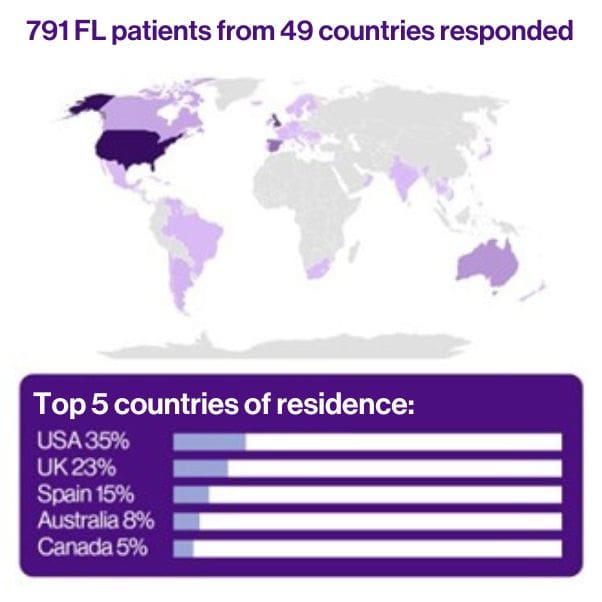
In June 2024, we conducted an online, global survey on immunotherapy to better understand the experiences and perspectives of follicular lymphoma (FL) patients. With responses from 791 patients across 49 countries, the insights provide a valuable glimpse into the priorities and concerns of the FL community.
Your input is crucial in shaping the future of immunotherapy research and FL care; thank you to everyone who participated in the survey. Below, we dive into some key findings and explore what they mean for patients.
The survey reached a broad audience, with the majority of respondents residing in the USA (35%), the UK (23%), and Spain (15%). In total, 49 countries were represented, spanning various regions across Europe, North and South America, Australia, Asia, and Africa.

One of the most revealing aspects of the survey was the variety of treatments that patients have undergone. The majority of respondents (about 60%) had received chemotherapy, with or without Rituximab or Obinutuzumab, highlighting the continued reliance on these treatments. Newer treatments like CAR-T therapy and bispecific antibodies were less common, with only 1.6% and 2.9% of patients, respectively, having received them. Around 16% of patients had not yet started treatment.

For many, the newer therapies are often explored through clinical trials. The data showed that only 9% of respondents had participated in clinical trials, which varied greatly by region, with the USA having the highest involvement.

If you’re considering joining a clinical trial, we recommend watching our webinar on FL clinical trials which offers a deeper understanding of clinical trials from experts and patients, to empower and enhance the patient journey.
When it comes to newer treatments like CAR-T therapy and bispecific antibodies, many patients reported they feel underinformed. On a scale of 1 to 5, the average awareness level was just 2.16, which was relatively consistent across geographical regions. This indicates a significant need for more accessible information.

People expressed the most valuable treatment information they would like to have would be on the risks and side effects of the treatments, their effectiveness and the treatment process. People were also interested in who can receive them, where they are available and available clinical trials.
Understanding the reality of accessing immunotherapies like CAR-T and bispecific antibodies can be complex. The survey identified several perceived barriers, with high treatment costs topping the list. This was most prominent in the USA, UK and Spain, where healthcare systems and insurance coverage vary widely. Other common perceived challenges included the availability of these treatments in local areas and individual suitability.
At the FLF we prioritize integrating these patient perspectives into research studies and sharing these insights with researchers. Our goal is to address patient concerns and improve future treatments, by ensuring that our programs reflect the real experiences and needs of patients.
The FLF’s CURE FL Awards program funds innovative research that targets challenges in CAR-T and bispecific antibodies, with the potential to significantly contribute to finding a cure for FL. We meet with the researchers periodically to discuss patient survey results and how they feed into the ongoing research programs. Additionally, we collaborate with medical education organizations to ensure that healthcare providers receive real and up-to-date information on patient perspectives, which can be incorporated into both practice and research.
For a deeper dive into some of the challenges, read our article, which explores the need for more cost-effective manufacturing processes to enhance accessibility and equity in cutting-edge therapies.
When considering treatment options, most patients prioritize treatment effectiveness whilst monitoring side effects. In fact, many patients prioritize effectiveness even if it means dealing with side effects. Other important factors include the treatment’s impact on overall well-being, as well as the duration and frequency of the therapy.
Factors such as the method of administration and a patient’s previous treatment history—like prior side effects and the number of previous treatments—were less of a concern. This insight is invaluable for researchers as they work on advancing FL therapies, ensuring that patient priorities are at the forefront of new developments.
For more resources and information on living with FL and understanding various treatment options, visit Your Support Hub on our website.
The survey found that most patients seek information at two key moments in their FL journey: at the time of diagnosis and before beginning a new treatment. Many patients also look for information during a recurrence or when experiencing side effects, underscoring the importance of providing reliable information during these critical times.
In the survey, many respondents shared valuable feedback on how we can enhance the information provided on the website. There was a strong desire for updates on recent research developments and treatments, comprehensive explanations about treatments, and more references to scientific research.
We are continuously working to enhance our communications and provide the latest research developments on our website, and we are delighted to know that it meets the needs and expectations of the FL community.
Educational videos featuring healthcare professionals, patient testimonials and stories, scientific articles and frequently asked questions from patients proved the most popular among the survey respondents.
Our ongoing webinar series offers expert insights from experienced healthcare professionals, along with patient perspectives on a variety of topics. Click here to view the webinar recordings, and stay tuned for upcoming webinars.

We love to hear the positive impact patient stories have on the FL community; These personal accounts were highlighted as one of the most valuable resources for patients, offering practical advice, inspiration and hope, read them here. Sharing your story can make a significant difference in someone else’s journey, helping to build a supportive and informed FL community.
We invite you to contribute to this collective voice by sharing your own experiences with FL. Whether it’s about your treatment journey, overcoming challenges, or the day-to-day realities of living with FL, your story can provide invaluable insights to others. Click here to learn more!

The survey results underscore the diverse experiences and needs within the FL patient community. By understanding these insights, we can help shape research to meet patient priorities. Your voice is vital in shaping the future of FL care and we sincerely thank everyone who participated in the survey.
We remain committed to enhancing our resources, ensuring that every patient has access to the information and support they need. As a community, we can work together to navigate the challenges of FL and stay informed about the latest research.
To keep updated on future opportunities to have your say sign up for our regular newsletter here and follow our social media.
Thank you to the FLF super supporter patient group for co-creating the survey with the FLF. Thank you to Jassen, Genmab & Abbvie for supporting this independent program. Funders had no input into the survey design or questions.
Visit Your Support Hub to access the help and resources you need and start living well with follicular lymphoma today.
Disclaimer: The information provided in this blog post is for educational purposes only and should not be considered a substitute for professional medical advice. Always consult with your healthcare provider for personalised guidance and treatment options.